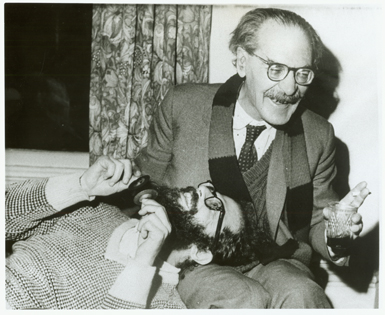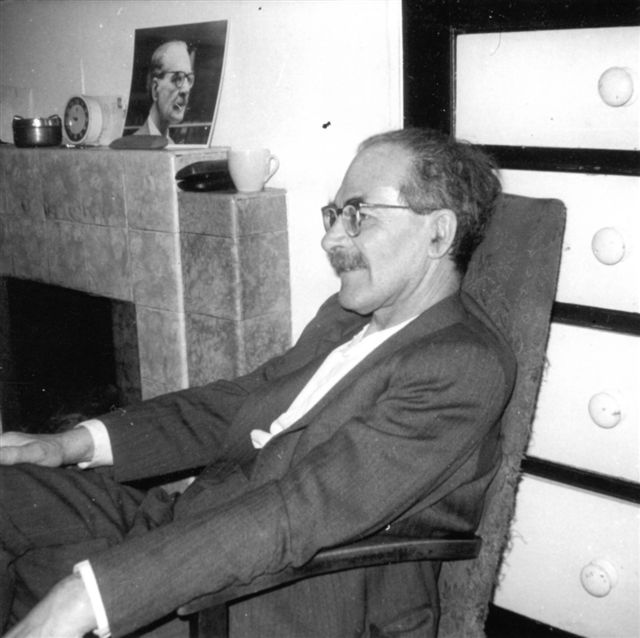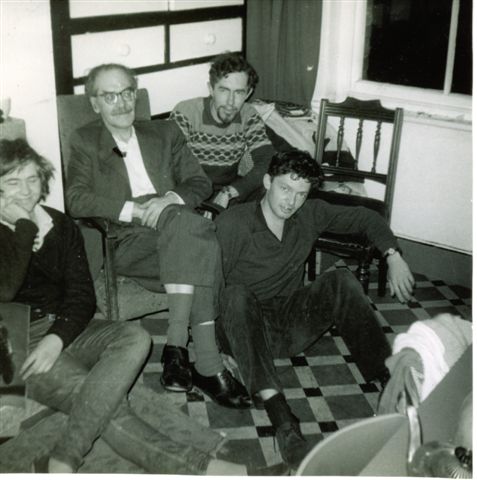Basil Bunting and A strong song tows us
Mark Knopfler inspired by Basil Bunting
26 March 2015 by Catherine Holdsworth in Basil Bunting and A strong song tows us, Entertainment
It would seem that art inspires art. Just as Basil Bunting, British modernist poet, took inspiration from his surroundings for his poetry, so Mark Knopfler, previously of the band Dire Straits has taken inspiration from Bunting for his new album, Tracker. Interestingly, Bunting spent the last years of his career working as a sub-editor for the Newcastle Evening Chronicle, which was where Knopfler began his career in journalism. This overlap has inspired a new song, simply titled ‘Basil’, and reflects Knopfler’s experience working alongside Bunting.
![]() He’s not the only one, though. Our very own Richard Burton was inspired by Bunting’s poetry to write his own biography of the poet, A Strong Song Tows Us, recently hailed as one of the best biographies ever written by Esquire, it takes the reader through Bunting’s life as well as looking at his poetry in great depth. Burton reveals that Bunting detested his job at the Evening Chronicle. When he left in August 1966, he was replaced by the journalist, Peter Stansill, who recalled his awe at being led to Bunting’s chair:
He’s not the only one, though. Our very own Richard Burton was inspired by Bunting’s poetry to write his own biography of the poet, A Strong Song Tows Us, recently hailed as one of the best biographies ever written by Esquire, it takes the reader through Bunting’s life as well as looking at his poetry in great depth. Burton reveals that Bunting detested his job at the Evening Chronicle. When he left in August 1966, he was replaced by the journalist, Peter Stansill, who recalled his awe at being led to Bunting’s chair:
“The deputy editor steered me to the huge subs’ table, around which clustered a dozen journalists, and pointed to the vacant seat that I was to occupy for the next seven months. ‘You’re filling the chair of an officer and a gentleman,’ a neighbouring colleague announced, ‘a poet and a scholar who translates from the ancient Persian.’ I had inherited not only the chair but also the workplace effects (though not the job) of Basil Bunting, who had retired only a few days before. These included a foot rule, a copy of the house style book and thick wads of copy paper, all kept in a locker in the hallway to the printing plant.”
The last thing Bunting would have wanted to be remembered as is a ‘gentleman’.
Basil Bunting on Creative Writing
16 April 2014 by Infinite Ideas in Basil Bunting and A strong song tows us, Entertainment
by Richard Burton, author of A strong song tows us
Hanif Kureishi isn’t the first author to cause outrage with off the cuff remarks about creative writing (see this Guardian article). Over 40 years ago Basil Bunting (probably deliberately) blew up the English department at the University of Victoria over the same issue. At that time the department was dominated by the flamboyant and charismatic poet Robin Skelton who was pioneering the new field of Creative Writing. Skelton had vigorously opposed Bunting’s appointment as a visiting lecturer, citing Bunting’s ‘lack of experience of Creative Writing’, which rather points up the difference between Creative Writing and creative writing, a difference that Bunting was to expose cruelly.

‘the only thing worse than a Creative Writing student is a Creative Writing professor.’ –Basil Bunting
As soon as he arrived Bunting gave interviews to the Victoria Times and The Daily Colonist and at some point in the course of each of them told the reporters that ‘the only thing worse than a Creative Writing student is a Creative Writing professor’. Perhaps unsurprisingly Skelton accepted this as the personal insult that was probably intended and Bunting was ostracized by the entire English faculty with one or two honourable exceptions. He returned prematurely to the UK, on the way pocketing a full year’s professorial salary for about one third of a year’s teaching. Hanif Kureishi’s cause might not be lost. Criticizing creative writing from within can be quite profitable.
For more information on the life and work of Basil Bunting, visit our dedicated site at www.basilbunting.com.
Bunting and Biography
16 January 2014 by Infinite Ideas in Basil Bunting and A strong song tows us, Book publishing
by Richard Burton, author of A strong song tows us
The old man in August Kleinzahler’s beautiful poem ‘The Bench’ is the poet Basil Bunting, the location Victoria, British Columbia, during Bunting’s disastrous winter at the University of Victoria in 1971-72 (LRB, 9 January). After a spectacular falling out with Robin Skelton, Bunting was left isolated, lonely and bitter, but Kleinzahler shows him keeping his eye on the horizon. Bunting’s preference was for the big picture but he also had a keen appreciation of the absurd and he would have relished some of the eccentricities in Michael Hofmann’s review of my Life of Bunting in the same issue. I am still trying to work out what an ‘exfoliated, whiskery’ biography might look like, and whether or not I have written one, and whether or not it is a good thing if I have; and I’m sure that Bunting would have found the comparison of the poet to Tintin as bewildering as I do. It’s not for me to quibble with Hofmann’s interpretations but I should correct the impression he may have left that Bunting’s relationship with biography was straightforward, because it wasn’t.
Hofmann writes that mine is the first ‘proper’ biography of Bunting but that I add little to his understanding of its subject beyond that provided by Victoria Forde, Richard Caddel and Carroll Terrell. He doesn’t mention Keith Alldritt’s The Poet as Spy: The Life and Wild Times of Basil Bunting, which was published in 1998. Forde and Terrell did include biographical chapters in their studies of the poet, and a clue to the strengths and weaknesses of Basil Bunting: A Northern Life by Caddel and Anthony Flowers, which is just 64 pages long and heavily illustrated, is embedded in its subtitle. Alldritt’s was in fact the first ‘proper’ biography but it is so heavily marbled with rumour and speculation that it is almost worthless. It was reading Alldritt’s book (which if anything damaged Bunting’s reputation) that stung me into writing A Strong Song Tows Us.
More important, Hofmann writes that I pay ‘lip service to Bunting’s personal opposition to biography’ and that I go ‘so far as to borrow the five parts of Briggflatts’ for my narrative structure. That often expressed objection is, however, compromised by Bunting’s full participation in the publication of Jonathan Williams’s Descant on Rawthey’s Madrigal, which told his story up to the mid-1960s, by his biographical introduction to the poems of Joseph Skipsey in 1976, in which he confesses to having sought out Skipsey’s surviving relatives for their memories, and by the fact that the subtitle of Briggflatts itself is ‘An Autobiography’. Bunting was not above using biography in pursuit of what he saw as a good cause. He did this because he recognised that the way to interest people in the work of a neglected poet is to tell his story. My ‘borrowing’ from Briggflatts was intended as a courtesy and recognition of Bunting’s ambiguous relationship with biography. Hofmann doesn’t seem to be too comfortable around ambiguity. He chides me for not telling readers whether Bunting was arrested in Paris in 1923 for biting a policeman’s nose or for kicking him in the pants. Nobody knows, and as the gritty wanderer of ‘The Bench’ would have been the first to insist, it really doesn’t matter.
For more information on the life and work of Basil Bunting, visit our dedicated site at www.basilbunting.com.
Bunting’s anniversaries
6 January 2014 by Infinite Ideas in Basil Bunting and A strong song tows us
by Richard Burton, author of A strong song tows us
Mark Ford, in his review of A Strong Song Tows Us in The Guardian, makes a connection that I haven’t seen anywhere else. “Of course,” he writes, “this biography has been written because in 1965 Bunting published Briggflatts, considered one of the greatest poems of the century.” Strangely enough it had never occurred to me that there was a semicentennial coming up but there’s no doubt that there is. Actually Ford is a little premature. The poem wasn’t published until the January 1966 edition of Poetry and didn’t appear in book form until the following summer, when Stuart Montgomery’s Fulcrum Press published it. But the first reading of Briggflatts was at the Morden Tower in Newcastle-upon-Tyne on 22 December 1965, so that allows us to claim an anniversary in 2015. A Strong Song Tows Us has had an odd relationship with Bunting’s anniversaries. I first introduced the idea of a biography of Bunting to the then publisher of his poetry, Oxford University Press, in 1995. The obvious publication date would have been 2000, the anniversary of his birth, but OUP weren’t interested and I shelved the project. And then Keith Alldritt’s imaginative reconstruction of Bunting’s life came out in 1998 and, in my view, did more damage than good to Bunting’s reputation.
In March this year I noticed another anniversary just as I was finishing the manuscript and putting the final touches to the introduction. I realised that it was 100 years to the month since Bunting stood in the Quaker burial ground in Brigflatts for the first time. In some ways that is the most important anniversary of all. As I wrote in A Strong Song Tows Us, it wasn’t just Brigflatts’ sprit of place that buoyed Bunting up through his tumultuous life. The clink of its stonemason’s chisel shaped his art. Meditation in the Quaker meeting house shaped his philosophy. His love for the stonemason’s young daughter, Peggy Greenbank, stayed alive through fifty years of separation.
Faber’s forthcoming edition of Bunting’s Complete Poems in 2015 will mark the 50th anniversary of Briggflatts’ appearance and will raise the profile of this extraordinarily neglected poet. It’s a shame it’s at least 75 years too late. We can blame T. S. Eliot for that.
For more information on the life and work of Basil Bunting, visit our dedicated site at www.basilbunting.com.
Bunting at Tom Pickard’s trial
27 November 2013 by Infinite Ideas in Basil Bunting and A strong song tows us
by Richard Burton, author of A strong song tows us
Liam Guilar, in his review of A strong song tows us, was sorry that I missed one of his favourite Basil Bunting stories: “It’s a fine book. There are a couple things I was surprised to miss: one of my favorite Bunting stories is about his appearance at Tom Pickard’s trial: Alldritt tells it briefly. Pickard tells it dramatically in More Pricks than Prizes building to a great exit line. But you can’t have everything.” The reason I didn’t tell it was that I was very dubious about the source and I hadn’t at that point seen Pickard’s memoir. Pickard was arrested in the mid 70s for his (relatively minor) part in a smuggled cannabis deal. As Pickard tells it:
“At the end of my long cross examination, it lasted a day and a half, I shakily resumed my seat next to [co-defendant] Costos while witness to my previous good character were drummed in. Amongst others, Eric Mottram and the film director, Lindsay Anderson spoke eloquently but the prosecutor ignored them until my final witness, Basil Bunting, took the witness stand…Bunting was someone the jury clearly felt comfortable with, which may be why the prosecutor rose to ask a question just as the old gentleman picked up his walking stick and was about to be helped from the witness box.
‘Wing Commander Bunting, would you still think so highly of Mr. Pickard if you knew that he took drugs?’
He smiled benignly and without a moment’s hesitation replied. ‘I would be surprised if a man of his generation didn’t.’
As Bunting walked out of the court Costos said, as much to himself as to those in earshot:
‘What a fucking beautiful old man.’”
From Tom Pickard, More Pricks than Prizes (2010) pages 63-68, by kind permission of Pressed Wafer.
ps. Pickard was found not guilty by a majority verdict.
For more information on the life and work of Basil Bunting, visit our dedicated site at www.basilbunting.com.
Bunting’s saqis
15 November 2013 by Infinite Ideas in Basil Bunting and A strong song tows us
by Richard Burton, author of A strong song tows us
I was grateful for Matthew Sperling’s positive review of A strong song tows us in the Literary Review and like him hope for a revival of interest in this great poet. I should clarify my position on one point that Sperling raises, not because it represents a mild criticism of my book but because it opens up a much wider and more important issue. Sperling suggests that I may, in my account of Bunting’s apparent predilection for adolescent girls, be a victim of ‘wilful blindness to a clear pattern in Bunting’s life’.
I thought longer and harder about this particular issue than any other, and I did so precisely in the light of the post-Jimmy Savile media hysteria to which Sperling fairly refers. The fact that I describe Bunting’s relationships with these young women should indicate that I am not blind to the pattern. Sperling may be correct about an element of ‘stunted, nostalgic sexual desire’, but in current circumstances that is enough to turn the man into a dangerous sexual predator. The reason for not drawing that conclusion is that there is not a shred of evidence that he was. I asked a number of people who knew Bunting well if they thought he had ever done anything for which he might be questioned in today’s febrile climate and received not one positive response. I am not blind to the possibility that they may have been protecting him but most of them had no particular motivation to do that. I am not suggesting that Matthew Sperling is making this particular leap from ‘pattern of relationships’ to something more sinister, but others undoubtedly will.
One of Bunting’s saqis, Hugh Kenner’s daughter Lisa, wrote about her relationship with the poet. Her account of a reading at which she officiated is a touching account of friendship across generations: “I was inexplicably moved. All thoughts of the hard bench and the itches on my nose and my aching back left me. I was no longer mesmerized by his eyes; actually, I felt that I could not truly see them, because they were not registering on this plane. It was his voice – raspy, deep, purring, falling like water – that carried me away to a level of thinking which I can barely describe, truly remember or convincingly relate. All I know is that we were alone (he and I) in poetry. We were a self-sufficient unit which read poetry and poured wine … What else could I feel but love for this old man who linked arms with me at cocktail parties … After going upstairs and pulling out the book of poetry he autographed for me, I flip through the pages trying to impress on myself the genius of this man. All the same, it is not a celebrated English poet whom I miss; rather an old man who shared a week of his life with a lonely ten-year-old.”
As Sperling says, it is a ‘delicate issue’ and I tried to handle it with care. Bunting’s saqis are around to tell their own stories if they choose to. I suspect that Lisa Kenner told us all we need to know.
For more information on the life and work of Basil Bunting, visit our dedicated site at www.basilbunting.com.



